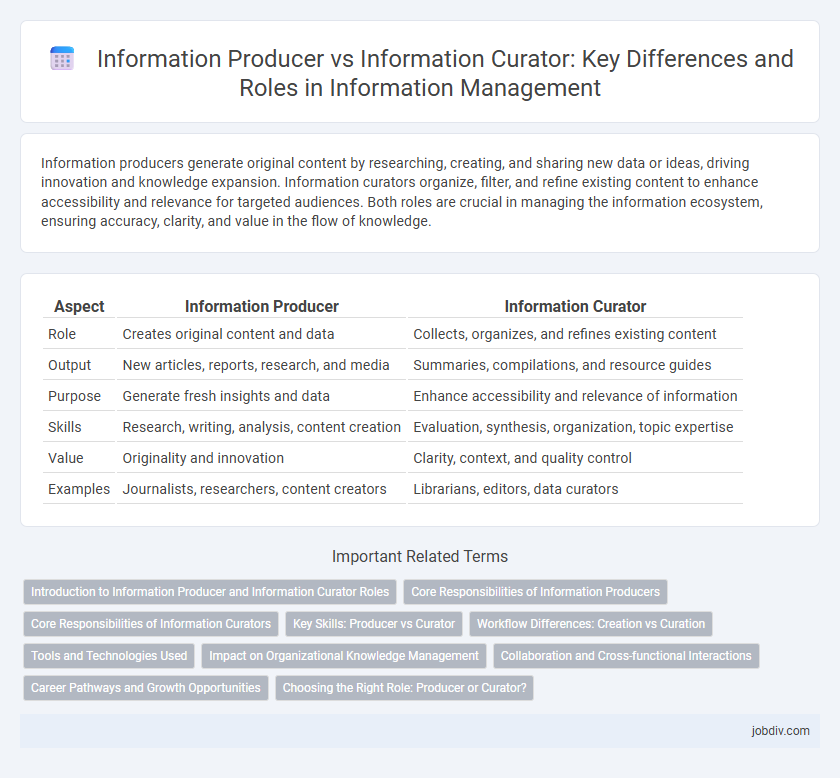Information producers generate original content by researching, creating, and sharing new data or ideas, driving innovation and knowledge expansion. Information curators organize, filter, and refine existing content to enhance accessibility and relevance for targeted audiences. Both roles are crucial in managing the information ecosystem, ensuring accuracy, clarity, and value in the flow of knowledge.
Table of Comparison
| Aspect | Information Producer | Information Curator |
|---|---|---|
| Role | Creates original content and data | Collects, organizes, and refines existing content |
| Output | New articles, reports, research, and media | Summaries, compilations, and resource guides |
| Purpose | Generate fresh insights and data | Enhance accessibility and relevance of information |
| Skills | Research, writing, analysis, content creation | Evaluation, synthesis, organization, topic expertise |
| Value | Originality and innovation | Clarity, context, and quality control |
| Examples | Journalists, researchers, content creators | Librarians, editors, data curators |
Introduction to Information Producer and Information Curator Roles
Information producers create original content by generating data, reports, or multimedia that serve as primary sources for knowledge dissemination. Information curators collect, organize, and verify content from various sources, enhancing accessibility and relevance for targeted audiences. Both roles are essential for effective information management in digital and traditional media landscapes.
Core Responsibilities of Information Producers
Information producers are responsible for generating original content, ensuring accuracy, and maintaining relevance by incorporating the latest data and insights. They focus on research, data collection, and content creation to meet the needs of target audiences while adhering to quality standards. Their role is critical in establishing the foundational knowledge that informs further analysis and curation.
Core Responsibilities of Information Curators
Information curators are responsible for selecting, organizing, and contextualizing relevant data to create meaningful and accessible knowledge repositories. They ensure accuracy, relevance, and coherence in the information presented while maintaining up-to-date content through continuous evaluation and refinement. Their core tasks include filtering vast data sources, categorizing information systematically, and enhancing user engagement through intuitive structuring and metadata tagging.
Key Skills: Producer vs Curator
Information Producers excel in research, content creation, and data analysis, enabling them to generate original insights and comprehensive reports. Information Curators specialize in evaluation, organization, and synthesis, ensuring that relevant information is accurately selected, categorized, and presented for easy access. Both roles demand strong critical thinking and digital literacy, but producers prioritize creativity and data generation, while curators emphasize discernment and information management.
Workflow Differences: Creation vs Curation
Information producers generate original content through research, data analysis, or firsthand experience, emphasizing creativity and innovation in their workflow. Information curators, on the other hand, aggregate, organize, and verify existing content to provide value by contextually linking and filtering relevant information for specific audiences. The workflow of producers involves content generation and development, while curators focus on selection, validation, and presentation to enhance information accessibility and reliability.
Tools and Technologies Used
Information producers utilize advanced content creation tools such as Adobe Creative Suite, 3D modeling software, and data analysis platforms like Python and R to generate original data and multimedia content. Information curators employ content management systems (CMS) like WordPress, digital asset management (DAM) software, and AI-powered algorithms for aggregating, organizing, and enhancing the accessibility of existing information. Both roles leverage cloud-based collaboration tools and metadata tagging technologies to ensure efficient workflow and data interoperability across diverse platforms.
Impact on Organizational Knowledge Management
Information producers generate original content and data, driving innovation and expanding the knowledge base within organizations. Information curators organize, filter, and contextualize content to ensure accuracy and accessibility, enhancing knowledge retrieval and decision-making efficiency. Together, producers and curators optimize organizational knowledge management by balancing content creation with effective information governance.
Collaboration and Cross-functional Interactions
Information producers generate original content and insights, driving innovation through expertise and data creation. Information curators organize, filter, and contextualize this data to enhance accessibility and relevance for diverse audiences. Collaborative efforts between producers and curators facilitate cross-functional interactions, improving decision-making and knowledge sharing across teams.
Career Pathways and Growth Opportunities
Information Producers generate original content and data, often advancing through roles such as data analysts, content creators, or research specialists. Information Curators specialize in organizing, validating, and managing existing information, with career growth leading to positions like knowledge managers, digital librarians, or information architects. Both pathways offer expanding opportunities in technology-driven sectors emphasizing data accuracy, accessibility, and informed decision-making.
Choosing the Right Role: Producer or Curator?
Choosing the right role between information producer and information curator depends on your expertise and goals; producers generate original content or data, contributing new knowledge, while curators organize, filter, and enhance existing information for easier access and relevance. Producers are essential for innovation and creating authoritative insights, whereas curators improve discoverability and contextual understanding through careful selection and annotation. Evaluating whether your strength lies in creating unique information or refining and structuring existing data will guide your decision toward maximizing impact in information management.
Information Producer vs Information Curator Infographic

 jobdiv.com
jobdiv.com